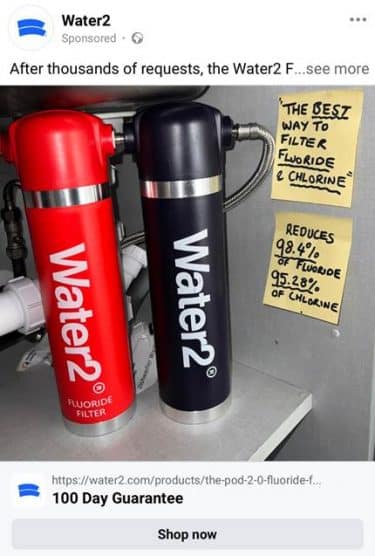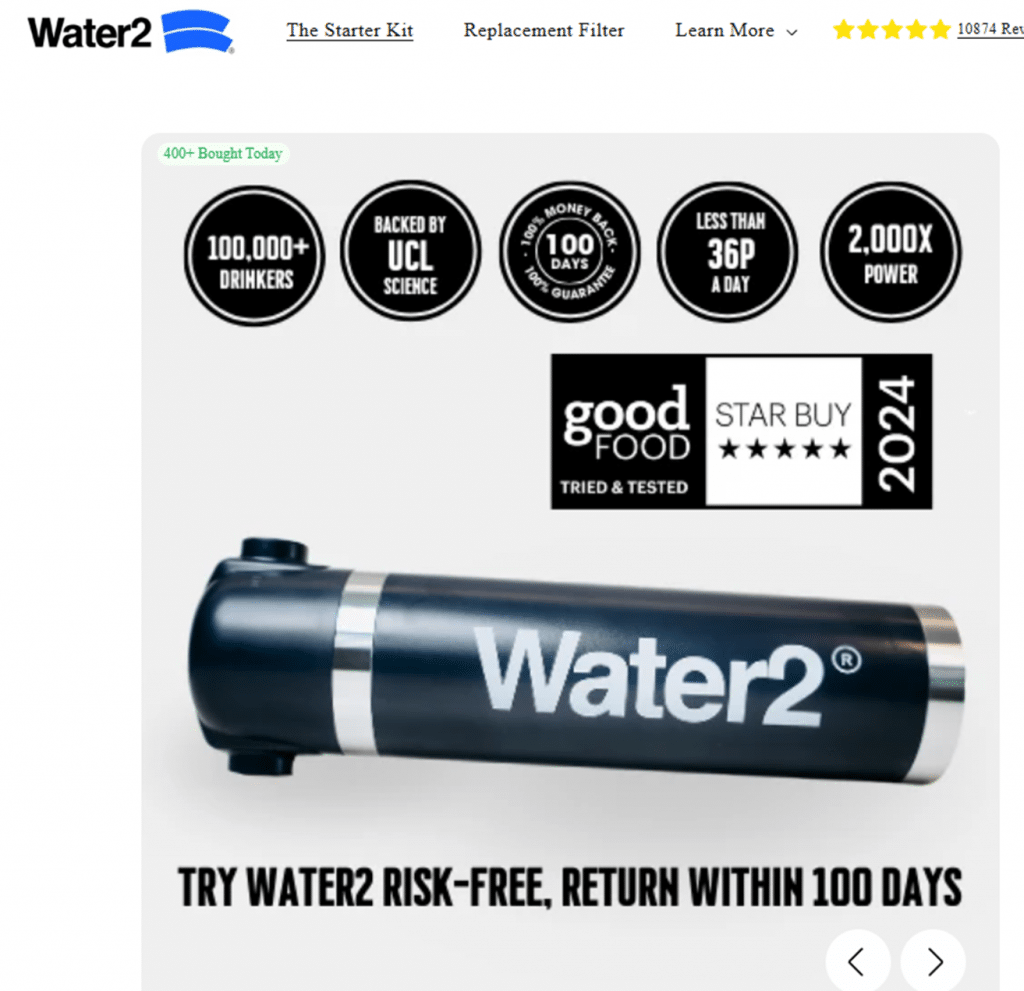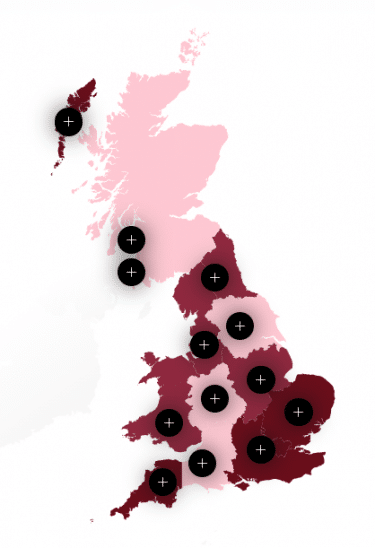As any regular users of the platform knows, Facebook advertising has become notoriously laden with pseudoscientific products making exaggerated claims. Most recently, my feed has been filled with ads for a company called Water2, showing two canisters connected beneath a sink, with sticky notes reading: “The BEST way to filter FLUORIDE and CHLORINE… Reduces 98.4% of Fluoride, 95.28% of Chlorine.”

The Water2 water filters claim that, when hooked into your water supply, they’ll remove chlorine and fluoride from your water. In fact, this was an ad for the Water2 Fluoride Filter Add-On, which (as the name suggests) is an add-on product to the existing Water2 2.0 Starter Kit. If you don’t have a Water2 2.0 Starter Kit filter already, you can buy it bundled with the new Fluoride Filter for £228… or if you act now, just £199. Each filter lasts for a year, at which point it’s a £99 annual cost for a replacement capsule.
The Starter Kits seem to be popular, as small text box on the product page informs us “400+ Bought Today”. It appears to say the same thing regardless of when you visit the site – of the half dozen times I checked the site, the sales were consistently at “400+ Bought Today”. Even when I deliberately checked the site at 12.01am.
Perhaps there’s a daily midnight rush on water filters.

Water2 explain the supposed benefit of their filtration kit:
We chlorinate our water across nearly every water system to disinfect and kill bacteria such as e.coli (definitely don’t want that) but that chlorine shouldn’t be there when we drink through that grim chemical smell.
The chemical smell of chlorine can be immediately offputting for drinkers and we see our customers transform their water immediately after installing their Water2.
Chlorine is a issue smelt and tasted by millions. But there are other contaminants that have also been found in isolated areas. Microplastics may be an emerging threat. Their presence has gone beyond plastic bottles, food and tap and they are now being found in human blood.
Lead piping still remains. Lead piping is still present in an estimated 25% of homes, despite it being illegal to be installed in new homes.
Elsewhere they explain that their regular 2.0 kit consists of a high-grade activated carbon filter made from coconut shells, which water passes through before entering their proprietary “ultrafiltration module”, which apparently has pores no wider than 0.1 microns. This, they claim, will therefore filter out 99.99% of microplastics, 99.99% of bacteria, 99.99% of parasites, 99.99% of cryptosporidium, 99.99% of asbestos, 99.99% of E. coli, 95.28% of chlorine, and 30-50% of lead.
In the UK, it is true that we do indeed use chlorine as a disinfectant in the water supply, in order to kill off bacteria. But is it the case that millions of UK tap water drinkers smell and taste chlorine in their drinking water routinely – enough at least to justify an expensive water filtration system? Not according to the Drinking Water Inspectorate (DWI), a public body formed in 1990 to provide independent reassurance that public water supplies in England and Wales are safe and drinking water quality is acceptable to consumers (our sewage-laden beaches and rivers fall outside of their jurisdiction, to be clear).
The DWI audits water companies and test drinking water, and have powers of enforcement if any drinking water samples fail their tests. As you might imagine, the DWI has information available on the chlorine levels in the drinking waters of England and Wales. There’s a page dedicated to it on their website. There is even a six-minute episode of the DWI’s podcast “On Tap” all about chlorine, where the DWI’s Principle Inspector, Ashley Parker, tells host Lydia that the chlorine levels allowed in our drinking water are quite safe, and that the level of chlorine in tap water in England and Wales is far lower than other countries, like the US. Our tap water typically contains around 0.5mg or less per litre, and no more than 1mg per litre – well below the WHO stated safety level of 5mg per litre.
While chlorine levels in our drinking water are clearly safe, people might sometimes notice a slight taste of chlorine, due to occasional maintenance works on water pipes, which might mean a little more chlorine gets through to the tap rather than being filtered out earlier. The DWI advises that, if you notice a new or strong taste of chlorine, you should contact the water company immediately, as it might be a sign that something is wrong. Still, if you happen to be particularly sensitive to the taste of chlorine at minute levels, you might think a water filter isn’t a terrible idea – it’s up to you whether you think the cost of having one fitted to your pipes is worthwhile.
What about the other pollutants on the Water2 filter list? 99.99% of bacteria, 99.99% of parasites, 99.99% of cryptosporidium and 99.99% of E. coli. This list inevitably implies that UK drinking water is otherwise filled or plagued with their presence – which, again, is not the case. According to the DWI:
Water companies must assess the risk of Cryptosporidium in its water sources, and design and continuously operate a water treatment process to remove the parasite or render it inactive. This is a regulatory requirement, and failure to comply is an offence.
If there is Cryptosporidium in your tap water, that’s a matter for the authorities, not a reason to splash out on an expensive water filter. Similarly, our drinking water by regulation has to be free from E. coli, and when it comes to bacteria, we use chlorine to get rid of before it got to your tap – that’s why the chlorine is there. The good news is that in each of the last three years of available results, 99.98% of samples tested passed the test for absence of microbiology, 99.96% had an absence of unwanted chemicals, and 100% of all samples were free from traces of pesticides. In 2020, of 134,730 samples taken, and traces of E. coli were found in just 11.
Equally, when it comes to other measures, 99.6% of samples met the standards for levels of lead, 99.83% met the standard for iron, and 99.86% met the standards for taste. We have very clean, safe drinking water here in England and Wales – and the same can doubtless be said for Scotland and Northern Ireland, whose waters are evaluated by their relevant regulatory bodies.
On the subject of lead, it’s not a huge reassurance that Water2 claims to remove 30-50% of lead levels, given how problematic lead contamination is. If there are levels of lead in your tap water, the solution isn’t a filter that reduces it by a third, it’s to have your pipes examined.
Water2 talks of removing 99.99% of asbestos from drinking water, which, once again, implies that there’s an abundance of asbestos in drinking water that must therefore pose a threat to our health. It is true that there are some asbestos fibres in drinking water – the UK government cites the WHO’s assessment that “the concentration of which varies between non-detectable and one million fibres per litre” – but studies have shown that there’s no evidence it causes harm. Asbestos is harmful when inhaled, because of the effects on the interior of the lungs, but that doesn’t then automatically mean it’s just as harmful when ingested in minute amounts. According to the report:
Although well studied, there has been little convincing evidence of the carcinogenicity of ingested asbestos in epidemiological studies of populations with drinking water supplies containing high concentrations of asbestos. Moreover in extensive studies in laboratory species, asbestos has not consistently increased the incidence of tumours of the gastrointestinal tract. There is therefore no consistent evidence that ingested asbestos is hazardous to health and thus it was concluded that there was no need to establish a health-based guideline value for asbestos in drinking water.
On their site, Water2 somewhat glosses over these issues, saying: “We are always told the UK has amazing water, but what about the times where this isn’t true? Over 100,000 homes now opt for a Water2 filter.”
It may well be the case that 100,000 homes opted to buy Water2’s water filter, but that isn’t evidence that they did so because their water quality wasn’t amazing – it may well be because they saw an ad telling them that, without a water filter, they’ll be ingesting E. coli and asbestos. That 100,000 figure is interesting, however, given they claim to sell more than 400 units per day… and they’ve been selling them for more than 250 days.
Prominently on the Water2 homepage is a map of the the UK on their homepage, alongside the text:
We’re always told about how great our water is, but here are cases where it’s not.
Whilst the UK has a relatively high sample pass rate, there are still issues up and down the country relating to bacteria, burst pipes, microplastics and much more. Just look at your area!

Each of the points on their clickable graphic (reproduced here) links to one of 13 tap water issues faced by residents around the UK, suggesting that the UK’s tap water supply is inherently unsafe. However, of the 13 highlighted incidents, one relates to an issue where fuel from a backup generator for a pumping station spilled into the water supply, giving the water an oily taste. It is unclear how effective the Water2 filter would have been in coping with this, but it was also an isolated incident that the water supplier was mandated to fix swiftly and provide alternative supply during the outage – it is hardly justification for an expensive home filtration system.
Worse still, three of the 13 highlighted issues (a 2022 incident from Severn Trent Water, and 2023 incidents from Trent Water and Bristol Water) related to periods where the water supply was disrupted due to leaks and outages. How a water filtration system is meant to be beneficial in the absence of a water supply is something Water2 doesn’t explain.
The remaining nine incidents in the list are indeed cases of water contamination… which were identified by the DWI or other regulators, and in some cases resulted in fines for the water companies. These are not examples of the routine need for water filters. The whole map feels uncomfortably like opportunism and scaremongering.
According to their website, Water2 was founded in 2020 by Charles Robinson, a philosophy student who “dropped out of university to work with his professors to fix the UK’s tap water crisis”. Again, it’s important to ask: what tap water crisis? The UK’s tap water supply is clean, safe and well regulated, and even the incidents highlighted by Water2 aren’t compelling cases for an expensive at-home solution. It is almost as if the motivation here is not safety, but marketing… or, as Robinson explains:
I started thinking about water filters in 2020 and realised something: it was a really blurred category. I could only name one brand, but how many water brands can you think of? At least ten.
This is not Robinson’s first business – he founded Gelcard, a company that was set up in April 2020 to offer “The Premium Hand Sanitiser Experience”. A month into the pandemic – at a time when hand sanitiser was at the top of our mind, even if stocks on supermarket shelves were selling out – Gelcard was “dedicated to hygiene innovation through brand collaboration and user experience obsession”. They sell – or possibly used to sell – single-dose hand sanitiser in credit card-sized disposable pouches… and, a few years ago, Robinson was explaining the need to deal with microplastics in the water supply.
Robinson isn’t in the water business alone. According to the Water2 homepage:
Bear Grylls, officially customer #8420, invested in Water2 earlier this year. The survival hero personally funded and co-led the development of Pod 2.0. Regularly sitting in on product meetings and supporting growth, he’s a hands-on Co-Owner determined to change how the World drinks.
To illustrate how hands-on in the business Bear Grylls is, Water2 features him holding and pointing to what is presumably a box of Water2 filters, while drenched in water. It is unclear whether Bear in the photo is still wet from the time he baptised his friend and accused rapist Russell Brand.

The partnership between Grylls and Water2 is doubtlessly the inspiration for Gryll’s recent media tour decrying the quality of UK tap water. “REVEALED: The truth about ‘horrendous’ British tap water”, said the Daily Mail. “Is Bear Grylls’ Water2 filter as good as Instagram claims?”, asked HELLO. “Tap water is ‘terrible’ claims urine-drinking adventurer Bear Grylls”, wrote Tom Whipple of The Times, in an article that squeezed every last drop out of the celebrity endorsement.
Grylls, who once sated his thirst by squeezing the juice out of elephant dung and slurping it down, made the comments while working with Water2 — a UK company that sells £129 filters that has previously got itself in hot water after being sanctioned by the Advertising Standards Authority.
Unsurprisingly, Water2 and Gelcard have been sanctioned for their advertising in the past. In May 2024, they sent out an email to their marketing list with the subject line “UPDATE: It’s gotten worse”, the body of which read:
100 people have fallen ill in Devon now. We can’t standby [sic] and watch this happen. […] We have made Water2 just £99 today. USE CODE: URGENT at checkout […] Every home in the UK needs a water filter. We have built a 30,000+ strong community of people brave enough to oppose UK tap water. This event is it, the day where everyone understands that we were right all along. UK tap water is broken. Please protect yourself with a filter. Again, just £99 with the code URGENT Stay safe and please drink filtered water. We’ll speak soon. Team Water2.
The ASA examined the ad and concluded “the urgent tone and alarmist language conveyed the impression that drinking unfiltered tap water was a health risk”, which they felt was “likely to cause fear and distress that was not justified”.
It’s not the only ad of Water2’s to wind them in hot water, filtered or otherwise. A quick search of the Facebook Ad Library shows that in March 2024, Water2 had an ad removed by Facebook for failing to declare it was a paid for ad. The ad is titled “A shocking Truth” and featured the text:
“UK tap water is broken…
❌ Forever chemicals
❌ Microplastics
❌ Lead
❌ Chlorine
❌ Hormones.
All swimming around in our water.”
Accompanying the ad is a video of Charles Robinson himself, explaining that “in the last couple of weeks, everyone’s been talking about this photo”… referring to the photo released of Kate Middleton with her children around the time of her cancer diagnosis. That is the photo Charles chose to use in his water filter advert. The video continues:
everyone’s been talking about this photo, and about how maybe we can’t trust the royal family, and they’ve been covering up different health issues. It’s got me thinking… do the royal family drink the same tap water that we’re told is the best in the world? So I thought let me do some research, and the results I found are actually shocking.
Charles then highlights a Telegraph article about how Barack Obama was told not to drink the tap water at Buckingham Palace, and a Daily Express article about how the royal family prefer bottle water to tap water, and therefore if those in power and the billionaires don’t drink tap water, you should buy a water filter… from Water2.
I have no reason to think that Water2 filters don’t filter water perfectly well – if you want to drink filtered water because you prefer it, that’s a choice you’re welcome to make. However, in my opinion, their marketing practices are not so clean and clear – from questionable partnerships with celebrity endorsements, to nodding towards conspiracies and billionaire coverups, to scaremongering about the alleged dangers of drinking tap water.
Tap water in the UK is some of the cleanest and safest in the world, and no amount of trawling by Water2 for news of water supply issues should scare you into thinking you need to fit an expensive filter for the good of your health.










